
|
|
Issue Number 15 • Tuesday, April 17, 2018 |
Campus ChampionAlyssa Marley, a senior communications studies major from Newburgh, N.Y., supports her concentration in media production with hands-on accomplishments. As president of the Cortland State Television club (CSTV), she’s led a two-year campaign that recently resulted in the station acquiring access to broadcast to a broader campus community audience via channel 20. Alyssa interns with the 2018 Blackbird Film Festival, serving as assistant director of content and marketing, and she hopes to network with amazing international filmmakers. Her documentary on Cortland’s downtown revitalization is one of the 53 percent of films made by women at this year’s festival. Tuesday, April 17Sexual Assault Awareness Month Film: “Miss Representation,” Sperry Center, Room 105, 4:30 to 6 p.m. Open Mic Night: Corey Union Exhibition Lounge, 7 p.m. Wednesday, April 18Sandwich Seminar: “Turkish Invasion of Syria: Afrin, Syria -An Experiment,” lecture by Edward Erickson, Scholar-in-Residence at the Clark Center for Global Engagement, Brockway Hall Jacobus Lounge, 12:30 to 1:30 p.m. Lecture: “The People and Culture of Pakistan,” presented by Ayesha Mazhar, a biological sciences major and Fulbright Scholar, Moffett Center, Room 205B, 7 p.m. Sexual Assault Awareness Month Presentation: Sexual assault and its lasting impacts will be presented by Justin Prentice, a star of the Netflix series “13 Reasons Why,” a teen drama about rape and suicide, Corey Union Function Room, 8 p.m. Thursday, April 19Union Matters Lunch Presentation: “Academic Workload,” presented by Darryl Wood, Labor Relation Specialist, Corey Union Function Room, noon to 1 p.m., buffet opens 11:45 a.m. Sandwich Seminar: Getting New York to 50% Renewables by 2030 – What Will It Really Take? Presented by Associate Professor of Physics Brice Smith and sustainable energy systems graduate student Sameer Hairan, Brockway Hall Jacobus Lounge, noon to 1 p.m. Holocaust Remembrance Film: “In Darkness,” Sperry Center, Room 106, 7 p.m. Friday, April 20Sexual Assault Awareness Month Lecture: “Feminism, Film, Men and the Media: Telling our Stories Through Film,” presented by filmmaker and screenwriter Jessica Congdon, Brockway Hall Jacobus Lounge, 4 to 5:30 p.m. Blackbird Film Festival: New York State Filmmakers Roundtable at 3:30 p.m.; Welcome ceremony, 6 to 6:30 p.m.; Block A Premiere, 6:30 to 8:30 p.m., Sperry Center; Kickoff Party at Bru, 8:30 to 11 p.m. Musical Performance: 9 to 5, Dowd Fine Arts Center Theatre, 8 p.m. Saturday, April 21Blackbird Film Festival: Films from 9 a.m. through 10:30 p.m., Sperry Center Musical Performance: 9 to 5, Dowd Fine Arts Center Theatre, 8 p.m. Sunday, April 22Blackbird Film Festival: Films from 9 a.m. through 5:30 p.m., Award Ceremony 5:30 to 7:30 p.m., Sperry Center The Big Event: Community cleanup. Volunteers will meet at Bru64 for complimentary regular coffee and treats before receiving assignments to clean up the Historic Downtown Cortland area, 9 a.m. Musical Performance: 9 to 5, Dowd Fine Arts Center Theatre, 2 p.m. Tuesday, April 24Tobacco-Free Awareness Activity: Kick Butts Day, an annual campus cleanup focused on tobacco debris and celebration of SUNY Cortland’s tobacco-free policy. Spring Planting Event: Hosted by the SUNY Cortland Garden Advisory Committee, at the model gardens in front of Memorial Library, 11 a.m. to 1 p.m. Wednesday, April 25Air Plant Giveaway: Air plants that need little care, but remove carbon dioxide from the atmosphere will be given away for free as part of the week’s Wellness Wednesday programming. Plants and information will be available from noon to 3 p.m. at the Student Life Center. Holocaust Remembrance Lecture: “Central Europe Swinging Right,” presented by Anna Orla-Bukowska, Jagiellonian University in Krakow, Poland, Old Main Colloquium, 12:30 p.m. Distinguished Voices in Literature Reading: By Bob Proehl, author of A Hundred Thousand Worlds, Corey Union Exhibition Lounge, 5 p.m. Holocaust Remembrance Lecture: “Polish-Jewish Relations,” presented by Anna Orla-Bukowska, Jagiellonian University in Krakow, Poland, Sperry Center, Room 106, 5 p.m. Thursday, April 26Sandwich Seminar: “I Learned by Doing,” presented by the Institute for Civic Engagement Action Team interns, Brockway Hall Jacobus Lounge, Noon to 1 p.m. Dowd Gallery Student Select 2018: Opening Reception and Award Announcements, show opens and continues through May 12. Friday, April 27Arbor Day: SUNY Cortland’s official Arbor Day celebration, Bowers Hall front quad, time TBD. College Singers Concert: Dowd Fine Arts Center Theatre, 8 p.m. Sunday, April 29Lecture, Demonstration and Performance: Shostakovich String Quartet # 8, Clinton String Quartet, in remembrance of the Holocaust, Corey Union Fireplace Lounge, 1 p.m. Monday, April 30Deliberative Dialogue: A civil and informed way for people with opposing views to discuss controversial issues: the topic of mass shootings was the number one concern voiced by SUNY Cortland students in a recent survey conducted by Institute for Civic Engagement Action Team interns, Corey Union Fireplace Lounge, 4 to 6 p.m. Environmental Documentary: “Who Killed the Electric Car?” (2006) unravels the history of the battery-powered vehicle that was to set a new precedent for energy efficiency before its mysterious discontinuation in the mid-1990s. In this investigative film, director Chris Paine attempts to uncover a possible conspiracy orchestrated against electric car manufacturers. A discussion facilitated by Sociology/Anthropology Visiting Assistant Professor Brock Ternes will take place following the video. Moffett Center, Room 2125, 7 p.m. |
SUNY Chancellor Honors Four Students04/11/2018Four SUNY Cortland students were recognized with the 2018 State University of New York Chancellor’s Award for Student Excellence on Tuesday, April 10, at the Albany Capital Center. The award recipients are:
The award is presented to students within the SUNY system who have been recognized for their academic success and have excelled in other aspects of their college lives as well. This can include leadership roles, campus involvement, athletics, career-related pursuits, community service or achievement in the arts, among other accomplishments. “I am immensely proud of these students, who have demonstrated academic excellence and dedication to enriching their campuses and communities,” said SUNY Chancellor Kristina M. Johnson. “From research publications in industry journals to volunteering in hospitals and local clinics to holding leadership roles at their institutions, I am inspired by each student we recognize today. Congratulations to all of the students receiving this year’s award.” Each year, SUNY campus presidents establish a committee to review and select outstanding graduating seniors. The nominees are forwarded to the Chancellor’s Office for a second round of review and the selection of a group of finalists. Each honoree receives a framed certificate and medallion to wear at Commencement in May. Along with this year’s honorees, 88 SUNY Cortland students have earned the Chancellor’s Award for Student Excellence since the program began in 1997. Here is a closer look at each of the honorees: Laura Barnstead Barnstead grew up thinking she’d pursue a career in medicine. 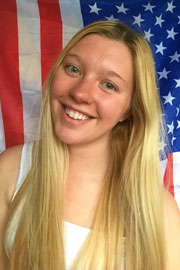
Then she won a New York state writing contest through Health Occupation Students of America (HOSA) as a high school student, earning a trip to Disney World in the process. By the time she arrived at SUNY Cortland, Barnstead’s goals had shifted. She blended her passion for politics and her skill for writing as a dual political science and professional writing major. “The combination of political science and writing gave me a holistic approach to what I could do,” Barnstead said. “The intersection of politics and writing is all around us. You can’t really be a political scientist without strong writing skills.” Barnstead got hands-on experience in the sweet spot between her two major interests, serving as the news editor of the Dragon Chronicle for three semesters. She also worked as the publicity intern for the Institute for Civic Engagement, developing a series of social media posts called “Humans of Engagement,” based on the popular Instagram feed “Humans of New York.” Barnstead’s posts highlighted the applied learning experiences of fellow Institute for Civic Engagement interns and increased audience traffic by more than 1,750 percent. Committed to service in the Cortland community, Barnstead volunteered 100 hours of her time through Alpha Phi Omega. She also was a resident assistant on campus for two years. “I knew right away that I wanted to be really involved as a student,” she said. “I was in high school. I also knew that the job market is competitive and that would set me apart from other people. I really just looked for extracurricular activities that further developed what I was already pursuing.” Barnstead, who graduated in December, currently works in the Washington, D.C. metro area. The ability to tailor her education to her interests, on top of the wide range of extracurricular activities in which she participated, have helped prepare her for life after college. “I got so much out of SUNY Cortland,” she said. “The biggest thing for me was the ability to progress through my degree in the way that I wanted to. I came in as a freshman and took some 300-level courses. That was really good for me because I was able to go through at my own pace and set my own schedule. SUNY Cortland in general is a great place to go to get your education because I feel like I came out well-rounded and ready to tackle problems.” Kaley Clavell Clavell’s teachers always knew what was in store for her. As a student, she was like a second teacher in the classroom. 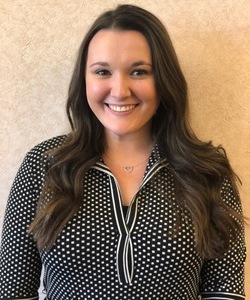
A childhood education and early childhood education dual major, Clavell has already put her skills to the test as one of the College’s Cortland Urban Recruitment of Educators (C.U.R.E) students. She has spent time student teaching in five different schools and has developed a passion for learning how school administrators can better serve their students. “I joined C.U.R.E. because I didn’t grow up in an urban area,” she said. “I knew how my experience was in school, but I didn’t know much about how other people’s experiences were because I grew up in a pretty affluent district. We had a lot of resources but that wasn’t everyone’s experience. “I am really interested in how urban education can shape the future of students in urban areas. I knew there was a need for really strong urban educators and I have a passion for working on the injustices in education.” This spring, Clavell is student teaching at the Bronx Charter School for Better Learning. She had previously taught at schools in Cortland, Ithaca, Marathon and Syracuse. During her junior year, she participated in the ethnography in education research forum through the University of Pennsylvania, researching the inequities and microaggressions that students of color face in schools. Clavell also has been an active presence on and off the campus. She served on the Student Leadership Cabinet in 2016 and 2017, as president of Students Active for Ending Rape (SAFER) and founded the Education Leadership Committee during the fall semester of her senior year. The Education Leadership Committee brings together education majors from all corners of SUNY Cortland. “It involves students from all aspects of education, from the early childhood program to special ed and phys ed,” Clavell said. “We talk about our concerns in our programs and work to get our voices heard.” Clavell has accomplished all of this despite undergoing a major surgery to remove a tumor in her jaw between her freshman and sophomore years. Thanks to the help of musical therapy staff members at Mount Sinai Beth Israel Hospital in New York City, Clavell got through the ordeal in high spirits. She was recognized by the Louis Armstrong Center for Music and Medicine as a patient who embodied the positive effects of music therapy. Clavell went on to become a champion for the Head and Neck Cancer Foundation’s “Faces of Courage” campaign. The experience made Clavell a stronger person and a more empathetic educator. “It really opened my eyes to the challenges that students go through,” she said. “I was a student myself going through a challenging time in my life. I had never related to students in that aspect. If they go through something or if they know somebody who is going through something, that can really affect every aspect of their life. I can relate it to the teaching field and it has made me such an advocate for so many different reasons.” Eryn Griep Griep not only comes from a big family — her mother has 12 siblings and her father has 10 — she is a first-generation college student. Those two factors shaped the path of Griep’s SUNY Cortland experience. 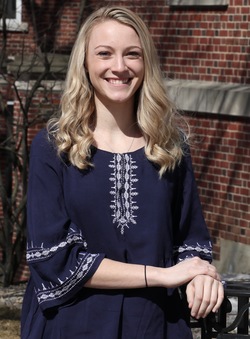
As a freshman, Griep found it hard to adjust to college life. Yet she had support from a number of places, including the College’s Resident Advisors. So she decided to pay it forward by becoming an RA herself. “I struggled a lot my first year and it was hard because no one else in my family had really gone through it,” Griep said. “I didn’t know what to expect. My sophomore year I became an RA because I wanted to help people who were going through the same situation. I knew if I could get through it, anyone else could.” She spent her sophomore and junior years assisting first-year students in Hendrick Hall and is currently an RA for primarily sophomore and transfer students in Smith Tower. Whether it’s a finicky roommate, offering tips on how to keep up academically, emotional support or everything in between, Griep is a lifeline for students in need. The work is never-ending, but she loves lending a helping hand. “You’re always on duty, technically,” she said. “But when it’s something that you enjoy that much it doesn’t feel like it’s taking up that much of your time at all.” She credits Marinda Souva, assistant director for transition programs, and her advisor, Anna Curtis, assistant professor of sociology/anthropology, for helping mentor her both in academics and becoming a better RA. Griep has been a member of the Criminology Honor Society and was a recipient of the Michael C. Holland Memorial Scholarship, awarded to students who excel either in Student Government or Residence Life and Housing activates. She has worked with the College’s Advisement and Transition Office. In conjunction with Residence Life and Housing, Griep has worked with residents in the annual Adopt-A-Family event, which raises money to provide gifts for local families during the holiday season. Griep has been so moved by her experience as an RA that she has decided to pursue a career in higher education. “Right now, I’m looking toward student conduct. I think it’s such an interesting office because I’m a political science and criminology major. I’ve also seen the positive impact that student conduct has had on a lot of my residents.” Griep admits that being an RA can sometimes be a thankless job. “There was one student who made it all worth it,” Griep said. “They struggled a lot but toward the end of the semester they said, ‘I wouldn’t be here without you.’” Marisa Lobelson Lobelson saw competitive mountain biking on television when she was a child and became enthralled by the sport. She travelled all across Connecticut, New York and New Jersey during her high school years, participating in races. 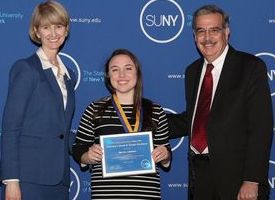
When Lobelson set foot on the SUNY Cortland campus, she didn’t waste any time in pursuing her passion. She founded the College’s mountain biking club during the fall semester of her freshman year. “It was an opportunity for me to grow in terms of my leadership skills and organization,” she said. “It taught me a lot about deadlines and how to lead as well. It was a club that had a lot of difficulties starting up and throughout my years running it, so that taught me a lot about perseverance.” A therapeutic recreation major, Lobelson graduated from SUNY Cortland in December. She chose to focus on the therapeutic side of recreation because she learned about the ways it can help those with disabilities or mental illness lead more fulfilling lives. “I really loved recreation and the idea of getting outside and connecting people to leisure,” she said. “I liked the idea of helping people with disabilities get connected to leisure. The instant I read about therapeutic recreation, I knew this could be it for me.” Lobelson recently finished an internship at New York Presbyterian/Columbia University Medical Center, where she worked in inpatient adult psychiatry. Her experiences there allowed her to do original research that combined the learning she had done in the classroom at SUNY Cortland with the hands-on work she did at the hospital. “One of the greatest opportunities that I had was that they let me create my own group protocol,” she said. “I was able to do research and create a group called Leisure Pathway, a leisure counseling group for patients. I was able to present this to the Therapeutic Recreation Department and the clinical team on the unit and it’s a group that is still being used there today at the hospital.” Lobelson also participated in the ski and snowboard club, the inclusive recreation club and served as a resident assistant. She also was a teaching assistant for a diversity and inclusive recreation services course, developing and teaching content on mental health and Native American diversity issues in recreation. While mountain biking might not be for everyone, Lobelson is excited to help patients find the recreational activity that is right for them. In addition to other treatments, including psychotherapy or medication, leisure makes a difference in people’s lives every day. “The main thing about leisure is that it’s what makes a person who they are at their core,” she said. “It’s what makes someone themselves and it gets them back to being themselves. A lot of times with mental illness, people won’t feel like themselves and they can’t control their thoughts. That’s the part of leisure that I really like in treating mental illness. It makes the person feel like who they are. They aren’t their mental illness, they are what they love to do.” Teacher Education Program Meets Tough New Accreditation Standards04/17/2018Years of preparation paid off for SUNY Cortland’s teacher education programs during a recent weekend, when a team of five outside reviewers gave the College unofficial approval for national accreditation under a new regime of toughened standards. When the Council for the Accreditation of Educator Preparation (CAEP) Accreditation Council issues its formal decision in October, SUNY Cortland — home to New York’s largest comprehensive teacher education program — is likely to become one of only eight New York colleges with CAEP’s rigorous seal of approval. “This fall, we’ll be one of only a handful of colleges in New York to have earned this honor,” said Andrea Lachance, dean of SUNY Cortland’s School of Education. “But for now, the teacher education faculty can take pride that a team of outside reviewers found what they already knew: teacher preparation at SUNY Cortland is truly outstanding.” The CAEP team visited campus April 8-10 to take a closer look at various aspects of teacher education at the College. This included a welcome reception and poster session that highlighted a variety of innovative partnerships and strategies used in SUNY Cortland’s teacher education program. The event, featuring presentations by students and faculty, attracted about 100 members of the College education community, Lachance said. The reviewers also conducted interviews with 17 different stakeholder groups, ranging from student teachers to regional host teachers to the school administrators who hire SUNY Cortland graduates, she said. The site visit was the final step in a multi-year process designed to hold America’s colleges accountable for providing effective teacher preparation and recognizing the nation’s highest quality programs. Prior to the visit, the College submitted a 100-page self-study describing the many ways SUNY Cortland’s teacher education programs meet all five of CAEP’s primary standards. The College had to demonstrate continuous improvement, quality assurance, credibility, equity and a strong institutional foundation. In 2016, CAEP’s rigorous standards replaced those of the National Council for Teacher Accreditation (NCATE) for national accreditation. Cortland was, and will remain, fully accredited by NCATE until the CAEP accreditation becomes official. “SUNY Cortland has been a respected institution for teacher education for more than a century and a half, and this positive review demonstrates that we will continue to be a leader in this field for years to come,” SUNY Cortland President Erik J. Bitterbaum said. “The faculty and staff of the School of Education worked very hard to be an early adopter of the new standards and we should all be proud of their accomplishment.” Capture the MomentNearly 750 members of the campus community, including Blaze, helped raise awareness of relationship abuse one yard at a time Sunday as part of a national “Around the World for Yeardley”effort. The event, held on different days on 25 SUNY campuses and other colleges across the country, is an initiative of the One Love Foundation. On Sunday, April 15, members of the SUNY Cortland community logged 4,185,448 yards to be counted toward the SUNY system-wide goal of 50 million yards during the month of April. Originally scheduled for the Stadium Complex, the event was moved into Lusk Fieldhouse due to bad weather. In Other NewsMusical NFL Coach Earns SUNY Cortland Honorary DegreePaul Alexander '82, a longtime NFL offensive line coach and trained classical pianist, will receive an honorary degree from the State University of New York during SUNY Cortland’s undergraduate commencement ceremonies on Saturday, May 12. Alexander, currently with the Dallas Cowboys, recently played piano and lectured on campus in a unique, combined presentation in which he explored the common threads connecting high-level performance in athletics and music. He will be the featured speaker for SUNY Cortland’s first two undergraduate commencement ceremonies. “Paul is an original thinker and his innovative approaches have led to success on the playing field and in the concert hall,” President Erik J. Bitterbaum said. “In so many ways, he exemplifies the values we try to nurture through a SUNY Cortland education.” 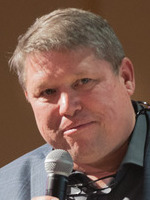
Alexander has coached in the NFL for a quarter of a century, starting with the New York Jets, then spending 23 years employing innovative methods to mold and motivate the widely respected offensive line of the Cincinnati Bengals. This year, he accepted a similar challenge to serve as offensive line coach for the Cowboys. Frequently, he has attributed his coaching success to the experience he had at SUNY Cortland, where he majored in physical education, minored in music and played offensive tackle for the Red Dragons for three seasons. As a senior, he became the College’s first-ever national Academic All-American by the College Sports Information Directors of America. After Cortland, Alexander earned a master’s degree in exercise physiology at Pennsylvania State University, serving as a graduate assistant under football legend Joe Paterno. From there, he moved to the University of Michigan as a graduate assistant for another gridiron legend, coach Bo Schembechler. He began his career in professional football as an assistant coach for the Jets in 1991 and started his long tenure with the Bengals in 1993. There, he built a reputation as one of the most innovative and respected offensive line coaches in professional football. Sports Illustrated called Alexander “the Michelangelo of NFL assistants” and selected him as the best offensive line coach in the league in 2016, when assembling a hypothetical coaching “dream team.” While with Cincinnati, he founded the nation’s first high school football camp exclusively for linemen and brought in Bengals players to help coach. Despite the time demands of professional football, Alexander began training as a classical pianist 10 years ago, following a love of music he developed at SUNY Cortland. Since then, he has performed at the University of Cincinnati Conservatory of Music and other venues, including a combined lecture and performance with the Cortland College-Community Orchestra in Old Main Brown Auditorium in March. He has also taken a turn at conducting the Hamilton-Fairfield Symphony Orchestra in Ohio. Although his passion for the piano began as an effort to help his daughter with her music lessons, Alexander quickly saw similarities between high-achieving athletes and world-class musicians. Using this unique perspective, he bridged the worlds of coaching and classical piano in Perform, a book chronicling his journey as an adult piano student and sharing lessons for athletes and musicians alike. Based on all of these achievements, Alexander was inducted into SUNY Cortland’s C-Club Hall of Fame in 2012. Two SUNY Cortland Professors Appointed as Distinguished FacultyTwo SUNY Cortland faculty members were recently appointed to the rank of Distinguished Faculty by the SUNY Board of Trustees. Sharon R. Steadman, a member of the Sociology and Anthropology Department, was elevated to the rank of Distinguished Professor. This title is conferred upon individuals who have achieved national or international prominence within their chosen field and serve as role models for students and other faculty. Peter K. Ducey of the Biological Sciences Department has been named a Distinguished Teaching Professor. This title is given to those who have demonstrated consistent superior mastery of teaching, service to students and commitment to ongoing intellectual growth and scholarship. “The SUNY faculty members receiving these distinguished ranks have achieved immeasurable success within their fields and on their respective campuses,” said SUNY Chancellor Kristina M. Johnson. “These individuals have set the bar for their peers, and work closely with students to help them find their calling inside and outside of the classroom. It is their excellence that drives SUNY forward.” “We are proud to honor SUNY faculty for their accomplishments as researchers, teachers, mentors, who are dedicated to their work and making a positive impact on campus,” said SUNY Chairman H. Carl McCall. “In order to receive distinguished ranks, appointees must possess the ability to lead and innovate, as well as meet the rigorous standards of our distinguished ranks. Congratulations to all honorees, who embody the spirit and values of SUNY’s core values.” 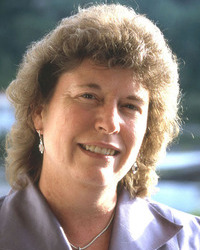
Steadman is a global authority on the Chalcolithic to Byzantine archaeological periods of the Turkish Anatolian plateau. She has supervised 14 excavations in locations such as Armenia, Cyprus, Israel and Jordan and has been the field operations director for excavations at Cadir Höyük in Turkey for the past two decades. Steadman is the author of countless articles and she was written two well-cited books, The Archaeology of Architecture and the Human Use of Space and The Archaeology of Religion. She is the co-author of Ancient Complex Societies. She edits the Oxford Handbook of Ancient Anatolia and has co-edited four essay collections. Her work has drawn acclaim for placing archaeological data alongside models of human behavior to create testable hypothesis of prehistoric phenomenon. Steadman has received grants from the National Science Foundation. She reviews grants for the National Geographic Society and also reviews book manuscripts and articles for 16 archeological journals. A member of the editorial and advisory board of Journal of Eastern Mediterranean Archeology and Heritage Studies, Steadman also serves the Committee on Archaeological Policy and the American Schools of Oriental Research. She becomes the eighth SUNY Cortland faculty member to achieve the Distinguished Professor rank. 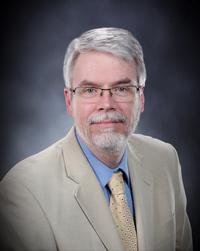
Ducey has devoted over two decades to the mastery of teaching and learning. He is a faculty mentor and introduces majors and non-majors to professional undergraduate and graduate research. Ducey maintains mentorships with former students, many of whom go on to become physicians and teachers themselves and attest to the positive impact he has made on their lives. A member of the SUNY Master Teacher Advisory Board for Central New York, Ducey shares his experience with K-12 teachers and administrators from across the region. He is frequently sought after as a model education and mentor with colleagues requesting him to attend their classes and offer suggestions. Ducey has a strong record of scholarship, which is reflected in his teaching. His students are authors or co-authors in more than 25 of his publications, including peer-reviewed journal articles and abstracts of conference proceedings. Ducey serves on the editorial board for Northeast Naturalist and has worked as a reviewer for the National Science Foundation and the National Institutes of Health. He is a recipient of the 2004 SUNY Chancellor’s Award for Excellence in teaching and the 2006 SUNY Chancellor’s/Research Foundation Recognition for Exemplary Contributions to Research in Scholarship. Ducey received the Excellence of the Use of Research in Teaching award from SUNY Cortland in 2002 and was recognized with an Outstanding Achievement in Mentoring Undergraduate Research award in 2016 and an Excellence in Academic Advisement Award in 2017. He becomes the 20th SUNY Cortland faculty member to achieve the Distinguished Teaching Professor rank. “Re:Thinking” Documentary Challenges EducatorsThe Blackbird Film Festival kicks off on Thursday, April 19 at SUNY Cortland with a locally-produced documentary that challenges viewers to consider a different approach to education. “Re:Thinking” will be shown at 6:30 p.m. in Sperry Center, Room 105. The film explores efforts in four school districts to shift focus from teaching children WHAT to think to teaching them HOW to think. It continues a conversation among local educators started by the Francis J. Cheney Educational Leadership Summer Institute at SUNY Cortland in the fall of 2017. The screening, like all Blackbird events, is free and open to the public. Local school educators are encouraged to attend. The film was directed and produced by Deborah C. Hoard, president of the Ithaca-based PhotoSynthesis Productions. Based on the findings of the husband-and-wife team of Derek and Laura Cabrera, who head the Cabrera Research Lab at Cornell University, “Re:Thinking” captures the voice of students, teachers, administrators and researchers and shows what can happen when they work in concert. A panel discussion will accompany the screening. Hoard will be joined by Sam Avery, Blackbird Film Festival director and an assistant professor of communication studies at SUNY Cortland; Luvelle Brown, Ithaca City School District superintendent; Andrea Lachance, dean of SUNY Cortland’s School of Education; and Chris Sperry, who directs Ithaca College Staff Development. SUNY Cortland’s Christopher Manaseri, assistant professor in the Foundations and Social Advocacy Department, and Holly Manaseri, associate professor in the same department, view the screening of “Re:Thinking” as an extension of the dialogue that originated at the 2017 Educational Leadership Summer Institute. The College invited Will Richardson, an influential author in the field of school leadership, to speak to interns and 120 area school leaders on the challenges facing tomorrow’s administrators. In the fall, many of those leaders returned for another meeting to further the discussion. “This film is showcasing educational environments and schools and leaders and teachers talking about the need to have different approaches that are personalized and responsive and flexible,” said Holly Manaseri, who serves as program coordinator of the Educational Leadership Program. “It’s about helping students be creative, not constrained,” she said. “We want this to be a continuous conversation in the Central New York region about teaching and leadership and what we can be doing jointly, from higher ed to our K-12 partners, to think about teacher and leadership preparation and how schools can be responsive for students.” Holly Manaseri is particularly interested to hear from teachers and administrators who have implemented new methods in their classrooms in schools based on the Educational Leadership Program’s summer and fall sessions. She also is curious to hear their reaction to the similar ideas that are posed in “Re:Thinking.” “We’re engaged with the community and we’re engaged with our K-12 partners and this is another example of how we can use that platform to bring people together for these kinds of conversations,” Holly Manaseri said. The event is sponsored by the School of Education and the Educational Leadership Program in the Foundations and Social Advocacy Department. The Blackbird Film Festival features 120 films made by student and independent filmmakers. This year, more than half of the films selected are directed by women. All festival events are free and open to the public. The Big Event Set for April 22On Sunday, April 22, SUNY Cortland’s fourth annual Big Event is expected to draw approximately 650 volunteers working at over 50 volunteer work sites throughout the Cortland community. The student-organized community clean-up offers the campus a chance to give back to the local Cortland community. Last year, 650 campus community members participated. “Community service has always meant a lot to me,” said Ursula Mates, this year’s Big Event director. “I’m just really hoping for the event to go well so it can continue in the future because it is such a positive thing for the SUNY Cortland community,” said Mates, a physics major from Lake Grove, N.Y. Since its inception in 2015, the Actively Involved in the Community (AIC) student club on campus has been responsible for organizing this event each spring. Mates, following in the footsteps of the SUNY Cortland Big Event founder, Ashlee Prewitt ’14, is inspired by similar Big Event service days at colleges across the country. 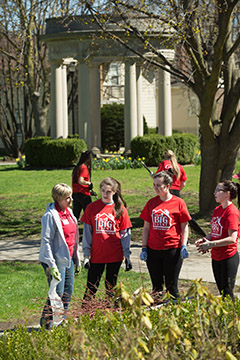
The Big Event originated in 1982 as a student-run service project developed by Texas A&M University. Although there is no nationally recognized organization for this specific event, colleges and universities across the U.S. have adopted similar projects on their campuses. Early stages of preparation for the SUNY Cortland event usually begins in January, according to Mates. As the Big Event draws closer, more and more people sign up and more involvement and collaboration start to happen. Four Greek organizations have committed to the event: Delta Phi Epsilon, Alpha Phi Omega, Alpha Sigma Alpha and Sigma Lambda Upsilon. Several clubs and groups on campus have also signed up to volunteer at the event, including women’s club volleyball, Taekwondo club, Jiu-jitsu club, Cortland Dance Company, club field hockey, club basketball, Ice Girls, and the SUNY Cortland Athletics Department. “We expect to get more groups that have discussed their interest in participating and they will most likely show up the day of,” said Mates. On April 22, everyone will head off to their assigned task sites, which will be given out at check in. Sites include the McEvoy Children’s Garden or Master Gardener Volunteers of Cortland County. Members of the community who can request a student group to help do work. Most of the volunteer sites are gardens, in addition to a church and a temple location where managers have requested student volunteers. Community home owners also ask volunteers to help with household chores such as raking leaves or picking weeds. Almost all of the work locations are within walking distance from the campus, but some require bus transportation. 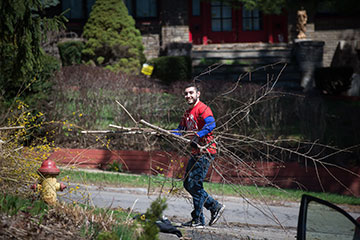
The Lynne Parks ’68 SUNY Cortland Alumni House staff annually eagerly accepts students as well. The Student Government Association (SGA) funds the necessary equipment such as rakes, gloves and shovels. “A lot of community members, who continually sign up, really talk about how much they appreciate it, and they request specific groups to return because they were so helpful in years past,” Mates said. Check-in will begin at 8 a.m. the day of the event in the Corey Union Function Room, followed by a kick-off ceremony at 9 a.m. President Erik J. Bitterbaum, SUNY Cortland Mayor Brian Tobin and Mates will speak. Breakfast will be provided by Auxiliary Services Corporation. For more information, contact Mates or visit the SUNY Cortland Big Event Facebook page. Prepared by Communications Office writing intern Hannah Bistocchi SUNY Cortland Students Present Research at TransformationsSUNY Cortland students worked tirelessly during the 2017-18 school year, conducting research in a wide range of academic disciplines. More than 100 students presented their results at “Transformations: A Student Research and Creativity Conference” held in Old Main on Friday, April 13. One student, junior sport management major Eva Kristof of Pleasanton, Calif., traveled halfway around the world to complete her project. In March, Kristof joined a Clemson University-based program that sent students from around the country to the Paralympic Winter Games in PyeongChang, South Korea. Kristof met with members of the International Paralympic Committee, Paralympic athletes and event organizers, learning about how the games are managed. Kristof’s “Transformations” presentation detailed the history of adaptive sports for people with disabilities and how the opportunities for those athletes continues to grow. The movement began when 16 servicemen and women injured in World War II competed in archery at the opening of the 1948 Olympic Games in London, England. The 2018 PyeongChang Paralympic Games featured 569 athletes from 49 nations competing in 80 medal-awarding events, including alpine and cross-country skiing, snowboarding, biathlon, ice hockey and wheelchair curling. The 2018 biathlon was open to athletes with visual impairments, as they used rifles that have a sound component to indicate the accuracy of their aim. Comparatively, the inaugural Winter Paralympic Games held in Sweden in 1976 had just 53 athletes competing in two sports, alpine and cross-country skiing. 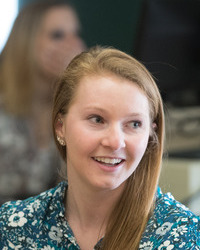
Kristof’s interest in adaptive sports is personal. She has a cousin with a disability who became involved in adaptive sports at a recreational level and interned last summer with the Shirley Ryan AbilityLab in Chicago, Ill. As a member of SUNY Cortland’s women’s ice hockey team, Kristof also has an affinity for winter sports. Seeing world-class athletes in person at the Paralympic Games gave her new insight into the possibilities of adaptive sports for all types of athletes. “I really learned a lot more about how much more is out there rather than the little bubble I was used to,” Kristof said. “The level that these athletes compete at is absolutely outstanding. I was working at my internship with more recreational adaptive sports so it was a lower level. Getting to see athletes compete at another level really opened my eyes and it has me pursuing another internship working with athletes competing at an elite level.” Kristof’s Korean experience was only the beginning. She’s soon heading off to an internship with U.S. Paralympics in Colorado Springs, Colo. Susan MacLaury ’68 delivered the Transformations keynote address, “Creativity: Lessons Learned Over Three Careers,” in Old Main Brown Auditorium. MacLaury, an Emmy and Oscar-winning executive producer, is the co-founder and executive director of the non-profit film production company Shine Global, Inc. She had previously spent decades in social work and as an associate professor of health at Kean University. Ten students who received 2017 Undergraduate Research Council Summer Research Fellowships also presented at Transformations. Their research ranged from biological sciences to mathematics to kinesiology and exercise science. 2017 Grad Elected SUNY Student Assembly PresidentThe new president of the SUNY Student Assembly (SA) is one of SUNY Cortland’s own. Former Student Government Association (SGA) President Michael Braun ’17 was elected in a unanimous vote of student leaders on Saturday, April 7. That means Braun soon will be the top student government representative for a network that boasts 64 campuses and more than 600,000 students, making it the largest comprehensive public university system in the U.S. The former political science major officially assumes office on Friday, June 1. “It’s an amazing feeling to know that the students across this system trust in me to serve as their next president,” said Braun, who currently is pursuing a Master of Public Administration (MPA) at Rockefeller College of Public Affairs and Policy at the University at Albany. “We’re the next generation of leaders in New York state. For my fellow students to listen to me and believe in my vision, that’s a great feeling. It’s something that motivates me every day.” Braun has served as the chief financial officer of the SUNY SA for the past year, helping the organization earn its largest-ever budget increase and creating new funding sources through corporate sponsorships. As president, Braun will be the lone student representative and a voting member of the 18-person SUNY Board of Trustees. He will be a crucial student voice on topics such as college accessibility and affordability, food insecurity among students and the quality of public education in New York state. “My job, at its core, is to make sure students are taken into consideration when talking about policy and vision for the system,” Braun said. “And, in a larger sense, my job is to make sure SUNY stays representative of the foundation it was built upon: accessible and affordable educational opportunity for all students.” He understands the value of public education because his own college experience — especially four formative years at SUNY Cortland — helps define it. A Long Island native from Elmont, N.Y., Braun ranked ninth in his graduating class at Elmont Memorial High School. He excelled in athletics and packed his high school years with other meaningful extracurricular activities, including a stint as class president. Still, balancing academic quality with cost was an important consideration during college decision-making process. “I knew the finances that my family had and I knew that I was going to pay for my own education,” he said. “A state university was the only realistic option.” Braun came to SUNY Cortland, in part, for a chance to play for the College’s nationally respected baseball team. A shoulder injury, however, cut his baseball dream short. In hindsight, it could’ve been the most pivotal experience of his undergraduate career. “I had to start over,” Braun said. “I had to ask myself, ‘Who do I want to be at Cortland?’” The simple answer is a leader. It started with Greek life, and Braun eventually ascended to the presidency of the College’s Interfraternity Council. Academic outlets included the College’s Model European Union as well as Moot Court, where he helped secure SUNY Cortland’s best-ever finish at a regional competition. He also excelled in his classes, eventually earning the Political Science Department’s Outstanding Achievement in Public Administration and Public Policy Award as a senior. 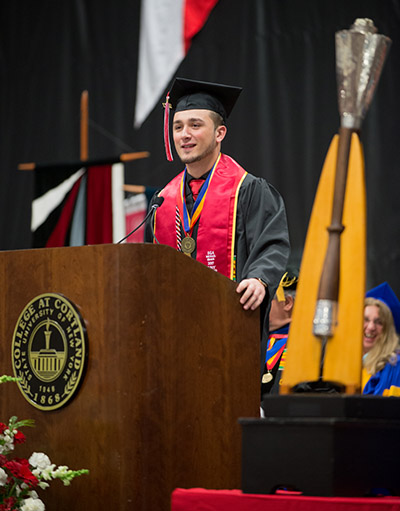
Professors noticed Braun’s potential too. Faculty members in the Economics Department helped develop his passion for labor policy by introducing him to colleagues across the country, who then connected him to a Washington, D.C., internship opportunity with North America’s Building Trade Unions. Braun worked there for two summers as a research intern and later became a legislative intern in Albany, N.Y., for United University Professions. “I enjoy advocating for things that truly matter to America’s working class,” Braun said. “I’ve seen the benefits firsthand of unions, affordable healthcare and quality public education.” Of course, Braun’s dive into student government also proved crucial to his growth. He served in the role of parliamentarian as a junior and recalled a speech delivered at Academic Convocation by Patrick Viscome ’17, the SGA president at the time. It inspired Braun to reach higher. As SGA president during the 2016-17 school year, he helped lead several student-focused initiatives. Those efforts included increasing student representation on administrative and faculty-led committees, fostering new ways to promote diversity, equity and inclusion and rethinking SGA’s framework to better represent SUNY Cortland students. He credited several mentors with helping to develop his leadership skills as SGA president, including College President Erik Bitterbaum, Vice President for Student Affairs Greg Sharer and Associate Director of Campus Activities Mary Kate Boland ’06, who served as the organization’s advisor. “At Cortland, I learned how to build relationships, be a good teammate and focus on priorities,” said Braun, who earned a SUNY Chancellor’s Award for Student Excellence in 2017. He specifically singled out the respect that Bitterbaum has earned across campus and the larger SUNY system. “The value of building relationships and gaining credibility is invaluable, and no one does it better than President Bitterbaum,” Braun said. “He’s looked at throughout the state as someone who people enjoy being around. It’s because, no matter the club or the organization or the cause, he’s always there supporting other people. He enjoys his role as president and it’s evident. “You have to enjoy what you do. He’s proof of that.” Bitterbaum returned the praise. “I can confidently say that the SUNY system will be in excellent hands with Mike at the helm of the Student Assembly,” Bitterbaum said. “He brings energy, insight and passion to all that he does, especially when it involves the needs of other students. We’ve been fortunate to educate so many wonderful leaders at SUNY Cortland and Mike stands out among the best. I’m very proud to call him one of our own.” In many ways, the SUNY SA presidency will present many of the same opportunities and challenges that Braun already has faced, only on a larger scale. He’s prepared for more frequent travel and delivering more speeches. But he said a career running for political office isn’t one of his short-term goals. “I have a passion for people — the middle class, the working class — and things like the economy and education,” Braun said. “I want to focus on my passion and the policy first before thinking about public office.” He does, however, hope that his example inspires other SUNY Cortland students. “Even if they’re not interested in student government or public policy, I want my experience in this election to be a motivational message for other Cortland students,” Braun said. “I want them to know that the opportunities are endless. You just have to find the open doors and walk through them.” Film Festival Panel to Embrace IdentityThe Blackbird Film Festival will focus more than ever on diversity and individuality in 2018. To this end, a panel on identity, particularly gender and sexual identity, will discuss these issues on Sunday morning. The festival’s film screenings are divided into thirteen blocks, each with a different central theme. Block J of the festival, Identity, will show seven short films, each relating to the topic of sexual and gender identity. The block begins at 10:30 a.m. on Sunday, April 22 in Sperry Center, Room 105. The Identity panelists will be announced at a later date on the Blackbird website. “The Identity block offers a peek into the lives of everyday members of the LGBTQ community, which is something we may not all be familiar with,” said Scott Clifford, a student event coordinator at the festival. “But we should celebrate the courage it takes to be authentically oneself.” Clifford, a senior communication studies major from Harbor Isle, N.Y., is in his second year working with the Blackbird Film Festival, having served as a submission judge last year. He and the other student coordinators are each responsible for the filmmakers from their particular block, a handful of whom will attend the screenings. The films for the Identity block include:
The Blackbird Film Festival runs from Friday, April 20 to Sunday, April 22. Contact Samuel Avery, assistant professor of communication studies and director of the Blackbird Film Festival, for more information. Prepared by Communications Office writing intern Ben Mayberry SUNY Cortland Plans Events to Remember HolocaustIn memory of the horrific events that took place during the Holocaust, SUNY Cortland has organized a series of events in April and early May. The College’s Project for Eastern and Central Europe, Clark Center for Global Engagement, Jewish Studies, History Department, Cultural and Intellectual Climate Committee, and Auxiliary Services Corporation have joined together to present the series to memorialize this monumental chapter in history. The events are free and open to the public. Annamaria Orla-Bukowska, a Polish social anthropologist professor and lecturer whose major field is Polish Christian-Polish Jewish relations in the 20th and 21st centuries, will give two separate presentations on Wednesday, April 25. Her talk, “Central Europe Swinging Right,” will begin at 12:30 p.m. in Old Main Colloquium. The second lecture, “Polish-Jewish Relations,” will take place at 5 p.m. in Sperry Center, Room 106. Orla-Bukowska currently serves as a Skalny Center Fellow at the University of Rochester. A professor from the Institute of Sociology at the Jagiellonian University in Krakow, Poland, Orla-Bukowska specializes in majority-minority relations, particularly issues of racism, extreme nationalism, and antisemitism and political anthropology. She lectures at the State Museum Auschwitz-Birkenau. The film “In Darkness,” directed by Agnieszka Holland, will be screened on Thursday, April 19. The event will take place at 7 p.m. in Sperry Center, Room 106. Based on a true story, “In Darkness” opens with Leopold Socha, a sewer worker and petty thief in a Nazi-occupied city in Poland. One day, Socha encounters a group of Jews trying to escape a ghetto and hides the group for money. However, what starts out as a business deal soon turns into an unlikely friendship and alliance between himself and the group of Jews he is hiding. The Clinton String Quartet will lecture on, demonstrate and perform the Shostakovich String Quartet #8 on Sunday, April 29. The concert will start at 1 p.m. in the Corey Union Fireplace Lounge. 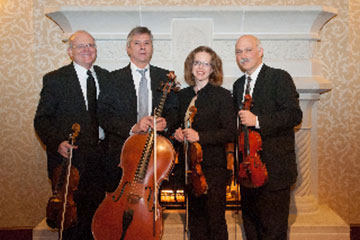
Refreshments will follow the performance. Additional co-sponsors for the concert at Temple Brith Shalom include CNYArts. Seeing the destruction left by the Allied fire bombing raids on Dresden in 1945, Dmitri Shostakovich was moved to write, in only three days, one of his most important works, which he dedicated “to the victims of fascism and war.” The Clinton String Quartet includes: violinist Michael Bosetti, who presently freelances with the Buffalo Philharmonic, the Binghamton Philharmonic, Symphoria and the newly formed Clinton Symphony; Ann McIntyre, a versatile violinist with a career that spans a range of performances including contemporary music, musical theater, symphony orchestras and chamber music who currently performs with a variety of ensembles in the CNY area, including the Society for New Music, Merry Go Round Theater, and Symphoria; Dana Huyge, violist, a full time member of Symphoria who also performs with the Albany Symphony; Cellist George Macero, who performs with Symphoria and as a soloist and chamber musician with the Society for New Music. The series concludes with a sandwich seminar discussion featuring Alexandru Balas, director of the Clark Center for International Education and coordinator of the International Studies Program, on Wednesday, May 2. Balas will discuss “When Good People Do Something. The Actions of Two Romanians and an El Salvadorian during the Holocaust,” at 12:30 p.m. in Brockway Hall Jacobus Lounge. “This is a story of three regular people who, against all odds, and with very ingenious ‘schemes,’ managed to save more than 130,000 lives during the Holocaust,” Balas said. “Three unlikely friends from two far-away countries, Romania and El Salvador, take action against evil regardless of religion, nationality or political identity, and help other human beings. At a time when the Holocaust seems to be fading away from memory, it is important to remember that heroes such as these three live amongst ourselves.” For more information about the series, contact Scott Moranda, associate professor of history, at 607-753-2052. Prepared by Communications Office writing intern Hannah Bistocchi SUNY Cortland Speaks for the Trees in Arbor Day CelebrationsThis Arbor Day, the SUNY Cortland campus is getting an addition to its “Tree Walk.” At 11 a.m. on Friday, April 27, Steven Broyles, professor and chair of the Biological Sciences Department, will plant a burr oak, which boasts the largest acorns of any North American oak tree, in between Bowers and Van Hoesen Halls. Student, faculty and staff volunteers are welcome to assist in the planting. Broyles and Adam Levine, facilities and geographic information systems manager, will then lead a tour of the campuses’ trees starting at noon from outside Bowers Hall. The SUNY Cortland tree walk website maps out the College’s urban forest and provides detailed information on each tree species. The forest contains over 35 different species of trees, each tagged with QR codes that may be scanned with smartphones to access more information. The digital map is just one of the things SUNY Cortland is doing to demonstrate its concern for the environment in general, and trees in particular, during this year’s campus recognition of Arbor Day. The Cortland Speaks for the Trees initiative is themed after The Lorax, a classic Dr. Suess book about a strange creature who “speaks for the trees” in the midst of a profit-inspired environmental onslaught hat introduced a generation of children to sustainability. It incorporated many fun activities in order to get the campus talking about trees and the ecosystem. “Trees do amazing work in the environment, from scrubbing the atmosphere of greenhouse gases like carbon dioxide, to mitigating water runoff to help prevent floods,” said Broyles. “They also help conserve energy by providing shade that helps cool buildings and parking lots and cars, but they can also act as windbreaks in the winter and help with saving heating costs.” The Campus Tree Advisory Committee, the SUNY Cortland Recreation Association and the Biology Club set up a display in the Student Life Center at which students, faculty and staff may compete at tree trivia in order to win prizes. The display incorporated a paper model of the fictional Truffula tree from The Lorax. Passersby were encouraged to write their own personal message about conservation on the leaves of the tree. The College is up for renewal of its Tree Campus USA status, originally earned in March 2014. SUNY Cortland merited this recognition by meeting Tree Campus USA’s five core standards for sustaining campus forestry. Among these stipulations is an official campus observance of Arbor Day. “Trees provide us with a lot of joy and there’s very good information out there that shows that people who live in a green environment that is full of trees have greater happiness and better health outlooks,” Broyles said. Contact Broyles for further information, and follow cortland_speak4trees on Instagram. Prepared by Communications Office writing intern Ben Mayberry
Brown Second-Fastest to 700 WinsSUNY Cortland head baseball coach Joe Brown earned his 700th career victory on April 10 when the Red Dragons defeated his alma mater, Ithaca College, 10-4. Brown, in his 19th season at Cortland, is the second-most-efficient Division III coach to reach the 700-win mark, accomplishing the feat in only 882 games. The late Don Schaly, who coached at Marietta College, reached the same total in 876 games. In all, Brown is the 38th Division III baseball coach to win 700 games. In 2015, Brown led SUNY Cortland to a national title and a final record of 45-4. He was named the American Baseball Coaches Association (ABCA) and D3baseball.com Division III National Coach of the Year. 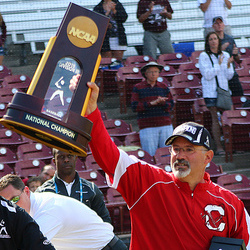
His teams have made 18 NCAA tournament appearances and played in 10 World Series. Brown’s teams have won 15 SUNYAC titles in his first 18 seasons and his 0.795 winning percentage (through April 15) is the best of any active coach nationally (NCAA Divisions I, II or III) with at least 10 years of experience. Brown is a 10-time recipient of the ABCA New York Region Coach of the Year and has won SUNYAC Coach of the Year six times. Thirty of his players have been chosen as All-Americans, including six who were selected in the MLB draft. In all, 19 of Brown’s players have gone on to play professionally. Prior to his promotion to head coach, Brown was the top assistant coach and pitching coach at SUNY Cortland. He also has coached the Ithaca Lakers (1992-99) and the Vermont Mountaineers (2013-16) of the Northeastern Collegiate Baseball League. He led the Lakers to three league titles and won another with Vermont in 2015. A 1990 graduate of Ithaca College, Brown played on the Bombers’ 1988 NCAA Division III championship squad. Brown was an assistant baseball coach at Finger Lakes Community College (1991) and Miami (Ohio) University (1992) before arriving at Cortland. SUNY Cortland Students Create Special Olympics ClubTwo SUNY Cortland students who coached for Special Olympics in high school continued their commitment in college this year by creating a new, 30-student campus club that trains local special-needs children for competition. And their first competition is bigger than the club founders imagined. Young athletes trained by the Cortland Stars Special Olympics Club will get to compete against Special Olympians from Ithaca as part of the annual Cortland Classic track and field event at the SUNY Cortland Stadium Complex April 21-22. “Our athletes will have an opportunity to compete with their peers, the other Special Olympians, and with our college athletes as well,” said freshman Catherine Troiano, who created the club with sophomore Kaitlyn Perlongo. “The integration of how our athletes work with them is really cool. Our athletes are going to get bib numbers and they’ll be officially timed and listed on the [CortlandRedDragons.com] website. It’s super great how they’re going to be treated just like how any college athlete will be treated. That’s really exciting for them.” 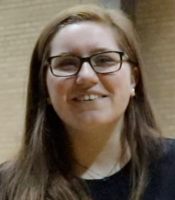
Troiano and Perlongo grew up together in Putnam and Westchester Counties, linked by a common bond: They both dedicated their free time to coaching Special Olympians. In this, both students were influenced by their parents. Troiano’s mother, Nancy Bellini, and her stepfather, Joe Bellini, are program director and program coordinator, respectively, at North East Westchester Special Recreation, a community-based therapeutic recreation agency serving children and adults with developmental disabilities. Perlongo’s mother, Kim Perlongo, a special education teacher, works with the agency part-time. When Troiano, a therapeutic recreation major from Katonah, N.Y., arrived on campus this fall, she decided to found the Cortland Stars Special Olympics Club in order to offer similar coaching experiences to SUNY Cortland students and provide opportunities for people with developmental disabilities in the Cortland area. Troiano is the club’s president and Perlongo, an inclusive education major from Brewster, N.Y., is vice president. “We’ve both been connected with people with developmental disabilities,” Troiano said. “We always grew up going to practices and programs so it’s been part of our lives since we can remember.” 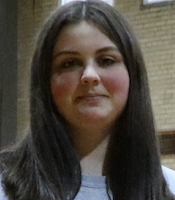
During the fall semester, Troiano and Perlongo worked behind the scenes to get the club off the ground, connecting with Karli Buday, the Cortland-Tompkins area coordinator for Special Olympics. The SUNY Cortland students also reached out to organizations in the local community that support people with disabilities, including schools, in search of young people with developmental disabilities who could benefit from training sessions. “This is amazing for the Special Olympics athletes that reside in Cortland and it provides so many valuable opportunities,” said Buday. “None of this could be possible without Catherine and Kaitlyn leading the way. They have taken it upon themselves to visit local agencies such as the Franziska Rackers Centers to chat with possible athletes and also raise awareness.” Nancy and Joe Bellini visited campus early in the spring semester to offer general and basketball-specific training to a group of 30 SUNY Cortland student coaches recruited by Troiano and Perlongo. The club meets on Tuesday evenings in the Moffett Center Gymnasium. A group of six school-age children work with the SUNY Cortland student coaches, who have trained their charges in basketball, floor hockey and track and field events. At the conclusion of the semester, having completed the requisite hours of training, the student coaches will become certified coaches themselves. “We are truly grateful for our volunteers, committee members and coaches, including Catherine and Kaitlyn, who dedicate their time to develop our local programs,” Buday said. “It means so much to the athletes in the Tompkins- Cortland Area.” 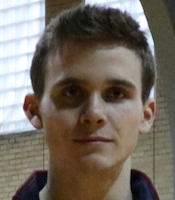
Connor Lewis, the club’s secretary, played a key role in helping the Cortland Stars end the semester on a big stage. A sophomore exercise science major from Glen Ridge, N.Y., Lewis is a member of SUNY Cortland’s track and field team. He and track and field head coach Steve Patrick worked on a plan to include the Cortland Stars in the Cortland Classic, an annual invitational meet open to college athletes from across New York state. The Cortland Stars will compete in standing and running long jumps and walking and running events as part of the meet. Saturday’s events begin at 9:30 a.m. and the meet continues starting at 10 a.m. on Sunday. Paula Cusano, who coaches Special Olympians in the Ithaca area, is bringing a team of 12 athletes to join the Cortland Stars at the meet. “Our athletes love having practice with all of the college kids around them,” Perlongo said. “For them to be able to go to that meet will be so exciting, to be surrounded by these people who are role models for them.” On a recent Tuesday evening, Lewis headed straight for Moffett Center to help coach at the Cortland Stars’ weekly meeting. He helped the young athletes work on their long jumps and basketball skills, offering plenty of laughs and encouragement along the way. Lewis can’t wait to watch the Cortland Stars show off their skills at the Cortland Classic meet. 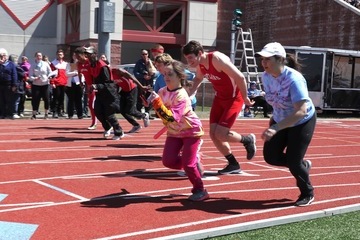
“It’s really exciting for me,” he said. “When we mentioned it to them, they shrieked. I know for me, I love to compete, and these kids have so much heart too. They’re into it as much as anyone I’ve ever seen.” The NCAA Division III Student-Athlete Advisory Committee (SAAC) initiated a partnership with Special Olympics in 2011. The purpose of this partnership is to enhance the lives of Division III student-athletes and Special Olympics athletes through mutual learning experiences, provide a platform for recognition of Special Olympics athletes and raise awareness of Special Olympics’ programs and services. The Cortland Stars’ leaders feel that they have already taken large steps toward accomplishing that mission. “You start a club and you think the first semester or two, you’ll work out all the kinks,” Perlongo said. “But we’re going to this track meet and it’s really nice to see the Cortland campus and community trying to work with us. They’ve been open to us and our athletes.” Troiano stresses that the club isn’t limited to those with backgrounds in therapeutic recreation, inclusive education or prior experience with the Special Olympics. She hopes to see the club continue to build its staff of student coaches in the years to come. “It’s super fun to be able to hang out and play sports,” she said. “Our athletes give us so much for us to learn about. They’re in such great moods and they’re so positive. It teaches our coaches a lot about having to be good leaders and being a role model and the important skills we try to learn throughout college.” Contact the Special Olympics Club for more information. Prepared by Communications Office writing intern Ben Mayberry  Suggest a feature story Suggest a feature story
Faculty/Staff ActivitiesFran EliaFran Elia, Sports Information Office, received the Special Awards Salute: 25-Year Award from the College Sports Information Directors of America (CoSIDA) recognizing members who have completed 25 years in the profession. Elia has worked at SUNY Cortland for 27 years, 26 of them as the full-time sports information director. Read more about Elia’s history with the College and with CoSIDA. Jeremy JimenezJeremy Jimenez, Foundations and Social Advocacy Department, recently co-presented his research about high school students taking the first LGBTQ class offered in a U.S. public school at the American Educational Research Association in New York City. Kathleen A. LawrenceKathleen A. Lawrence, Communication Studies Department, recently received word that two of her poems were accepted for publication in the upcoming anthology The Daily Abuse. Her poem “Too Many To Count"” is written in long free verse inspired by the #MeToo movement and her own recollections growing up female. Her second poem is a four-column abecedarian titled “A Sexual Assault in the Woods.” This poem was previously published in Crow Hollow Magazine 19. Jean W. LeLoupJean W. LeLoup, professor emerita (Spanish), International Communications and Culture Department, and the U.S. Air Force Academy, along with colleague Haning Z. Hughes, had their article “Time and history in lyrics: A unique approach to teaching culture and civilization,” published in NECTFL Review 81, the journal of the Northeast Conference on the Teaching of Foreign Languages. In addition, with colleague Barbara Schmidt-Rinehart, their article “El voseo: A call to action” in Visionary essays: The future of Spanish and Portuguese” was published in the centenary issue of Hispania 100. Hispania is the official journal of the American Association of Teachers of Spanish and Portuguese. Kevin PristashKevin Pristash, Campus Activities and Corey Union Office, attended the annual conference of the Association of College Unions International from March 22 to 25 in Anaheim, Calif., where he received, on behalf of SUNY Cortland, an award celebrating the College’s 50 years of membership. It was presented at the event’s honors luncheon. Emily Quinlan and Marinda SouvaEmily Quinlan and Marinda Souva, Advisement and Transition, facilitated a roundtable discussion on Excelsior Scholarship’s impact on advising and academic decision making at the first annual SUNY Academic Advising Conference held in February in Albany, N.Y. Lori Schlicht and Abby ThomasLori Schlicht and Abby Thomas, Advisement and Transition, presented a poster regarding Academic Alert and a concurrent session titled “Enhancing Faculty Engagement in Advising” at the first annual SUNY Academic Advising Conference held in February in Albany, N.Y. Robert SpitzerRobert Spitzer, Political Science Department, spoke on “Gun Policy and Schools After Parkland” at the SUNY Student Assembly Spring Conference held in Syracuse on April 7. Bekeh UkelinaBekeh Ukelina, History Department, and three of his African history students, presented a digital history project titled, “Where do we come from? African Origins of Human Life and Migration” at the New York African Studies Association annual conference held April 13 and 14 at Seton Hall University in South Orange, N.J. Also, Ukelina’s book, The Second Colonial Occupation: Development Planning, Agriculture, and the Legacies of British Rule in Nigeria, won the New York African Studies Association (NYASA) Book Award. The award was presented on April 14 at the NYASA conference at Seton Hall University. Also, Ukelina presented a paper at the same conference titled “The Miseducation of the African Child: Migration and the Legacies of the Colonial School System in Nigeria.”  Submit your faculty/staff activity Submit your faculty/staff activity
|
The Bulletin is produced by the Communications Office at SUNY Cortland and is published every other Tuesday during the academic year. Read more about The Bulletin. To submit items, email your information to [email protected]
© 2026 SUNY Cortland. all rights reserved.